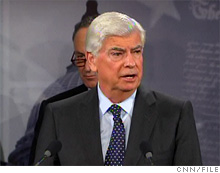|

Why 'say on pay' won't
work
Reformers are counting on
shareholders to rein in compensation. But big investors seem inclined to
remain quiet and preserve the status quo.
Colin
Barr, senior writer
November 16, 2009:
5:04 AM ET
| |

Sen. Chris Dodd
would give shareholders a nonbinding vote on executive pay. |
|
| |
|
| |
 |
NEW YORK (Fortune) -- Waiting for
investors to slam the breaks on runaway executive pay? Don't hold your
breath. Although Congress may give shareholders more of a say on pay soon,
big money managers seem content to keep their mouths shut.
Senate Banking Committee Chairman
Chris Dodd, D.-Conn., unveiled a financial reform plan this month that would
give investors in public companies an advisory vote on pay policies starting
in 2011.
It's the latest boost for
say-on-pay plans, which reformers have been pushing in recent years with
some notable support. The idea is that shareholders, as the owners of public
companies and the natural guardians of the corporate purse, will pressure
directors to hold the line on pay -- particularly at underperforming firms.
President Obama has backed making
say on pay mandatory. More than two dozen companies, including Verizon and
Microsoft, have adopted the plans.
Say on pay seems particularly
appealing now, as Wall Street firms prepare to pay out huge bonuses at a
time of high unemployment and massive taxpayer-funded subsidies for the
economy.
But there's a catch. The biggest
investors -- institutions such as mutual funds and pension funds that hold
more than half of all shares -- have shown little interest in playing pay
watchdog. And it's not clear that will change even if the government
mandates say on pay as part of the financial reform taking shape in
Washington.
"We just haven't seen a huge
amount of effort being put out by institutional shareholders to affect
compensation levels," said Bernard Black, a law professor at the University
of Texas. "Whether it's because they don't mind the pay practices or because
the money managers are making millions themselves, you don't see them
jumping up and down."
Black notes that institutions
rarely try to elect their own candidates to boards or take other actions
that might be classified as shareholder activism. But critics go further.
A recent study co-sponsored by a
union pension fund and a top governance firm dubs many of the biggest mutual
fund firms -- including Ameriprise, AllianceBernstein, Barclays and MFS --
as "pay enablers" for supporting management pay proposals and opposing those
by shareholders.
The report, co-sponsored by the
Corporate Library and the American Federation of State, County and Municipal
Employees (AFSCME), chastised the funds for "failing to use their voting
power in ways that would limit compensation excesses."
MFS disagreed with these
findings. The closely held Boston-based firm said the study "did not truly
reflect the firm's position on executive compensation." The fund firm added
that since 2007, it "has determined excessive executive compensation at over
70 issuers and has not supported over 200 directors due to excessive
executive compensation concerns."
MFS hasn't been a fixture on the
pay enabler list. But Ameriprise, AllianceBernstein and Barclays have made
it each of the last four years, the report said.
These firms didn't respond to
requests for comment, but Richard Ferlauto, who directs corporate governance
and pension investment at AFSCME, said it's clear they aren't looking out
for their customers.
"The funds have an obligation to
their investors to monitor the performance and the practices of their
holdings," he said. "Had there been more rigor on the part of these funds in
reviewing their investments, some of the worst problems of this downturn
could have been avoided."
Eleanor Bloxham, who runs the
Value Alliance corporate governance firm in Westerville, Ohio, said big
shareholders don't tend to take an active role in overseeing pay because the
industry is rife with conflicts of interest.
"Everyone is in the same boat in
the financial services business, as suppliers and customers and 401(k)
holders," she said. "There is no great will to stand up."
By the same token, researchers
say cost-benefit analyses often make activism less attractive to
institutional shareholders. Big firms often hold thousands of stocks in
giant diversified portfolios, making intensive monitoring a major chore.
"I'm not one who believes
corporate governance will solve our problems," said Margaret Blair, a law
professor at Vanderbilt University in Nashville, Tenn. "Shareholders are not
in position to address the main problem, which is the incentives we are
giving to management."
Still, for all its limitations,
say on pay is widely acknowledged to be better than one oft-mentioned
alternative -- greater pay regulation.
"At most, say on pay might bring
down some of the biggest paychecks. But I don't see how that's such a great
threat to capitalism," Black said. 
|
©
2009 Cable News Network. A Time Warner Company ALL RIGHTS RESERVED. |
|